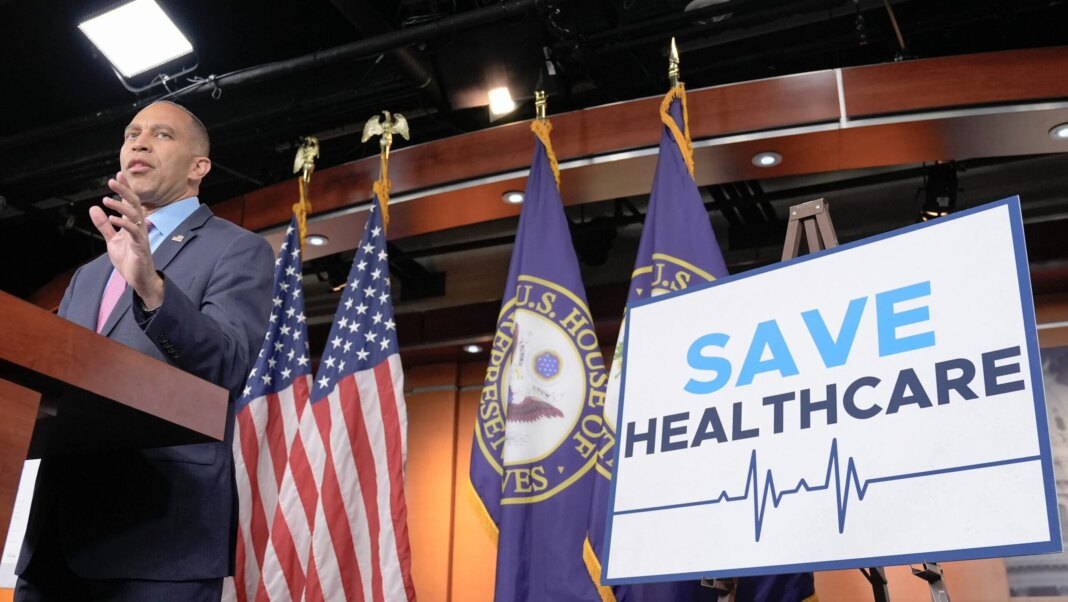Stalemate in Washington: The Government Shutdown Continues
As the clocks tick towards a weeklong government shutdown, the impasse between Republican and Democratic lawmakers shows little sign of resolution. Public dialogues often echo with fierce accusations and finger-pointing, particularly from President Donald Trump, who maintains that the Democrats are to blame for impending layoffs among federal workers. On Sunday night, he claimed that job losses are already occurring, pressing the narrative that these disruptions are a direct result of Democratic resistance.
President Trump’s Assertions
During a press briefing, Trump emphasized, “The Democrats are causing the loss of a lot of jobs,” failing to specify which agencies might face layoffs. His statements interlink the shutdown with a strategic focus on public sentiment, as both parties seem to gauge the political winds, betting that they can maneuver the other side into submission. With Americans directly impacted by the shutdown, Trump’s administration is framing the situation in a way that aims to shift blame while maximizing its leverage in budget negotiations.
Economic Context
The backdrop of this political deadlock is a concerning economic landscape. Despite modest growth, the U.S. economy is grappling with slowed hiring rates and stubbornly high inflation, largely exacerbated by Trump’s import taxes. As fears grow over the possibility of layoffs and budget cuts, there is an increasing recognition that the current trajectory of a nearly $2 trillion annual budget deficit is unsustainable. This economic fragility creates a tense atmosphere, making it imperative for lawmakers to navigate negotiations carefully—yet trust seems in short supply.
Stagnant Negotiations
House Democratic Leader Hakeem Jeffries, speaking on various news platforms, echoed a sense of frustration, revealing that there have been no productive discussions with Republican leaders since a meeting at the White House the previous week. He criticized their silence and failure to engage in the negotiation process, labeling the situation as irresponsible. Jeffries’ perspective reflects a larger concern among lawmakers about the effectiveness of traditional negotiation methods in an increasingly polarized environment.
Budgetary Power Struggle
The Trump administration appears to view the shutdown as a tactical opportunity to assert greater control over budget discussions. Officials have suggested that furloughs could translate into permanent cuts, a strategy unprecedented in its implications. This tactic not only raises ethical questions but also underscores the significant risks associated with weaponizing budget negotiations. The administration seems to believe that the responsibility for any fallout from these layoffs can be pinned on the Democrats, creating a complex web of accountability.
Democratic Demands
Amid these tensions, Democrats continue to advocate for renewing health insurance subsidies for millions of Americans, framing their demands as vital in the face of a looming healthcare crisis. They argue that increased healthcare costs would further burden families already struggling under economic pressures. Yet, they note the challenge posed by Trump’s administration, which has taken measures to block previously approved spending, undermining potential compromises.
Media and Public Sentiment
As public discourse unfolds, it has often been shaped by the somewhat sensational tactics of both parties. Memes and social media campaigns have increasingly colored the narratives, complicating genuine negotiation efforts. Vice President JD Vance recently defended a controversial video featuring Jeffries, which faced backlash for its tone and implications. This symbolizes broader concerns about the degradation of civil conversation in a time when bipartisan cooperation is essential.
Legislative Landscape
The legislative landscape is further strained by failed attempts to advance a Republican bill intended to address the shutdown. Senate Democrats have voiced skepticism about the sincerity of the negotiations, particularly as House Speaker Mike Johnson acknowledged the failure of this proposal to gather the necessary support. The looming question of how to advance legislation without direct engagement further complicates the atmosphere in Washington.
Future Prospects
As discussions continue, Senate Majority Leader John Thune indicated that the impasse could extend as long as Democrats continue to oppose Republican proposals. He expressed hope that votes in the coming days might sway party lines, illuminating the precarious dance of negotiations. Both sides seem to be stuck in a game of political chess, where the stakes are not only economic stability but also the very livelihoods of federal workers.
The road ahead remains fraught with uncertainty, raising critical questions about governance, accountability, and the ongoing ramifications of partisan strife within the halls of power.



